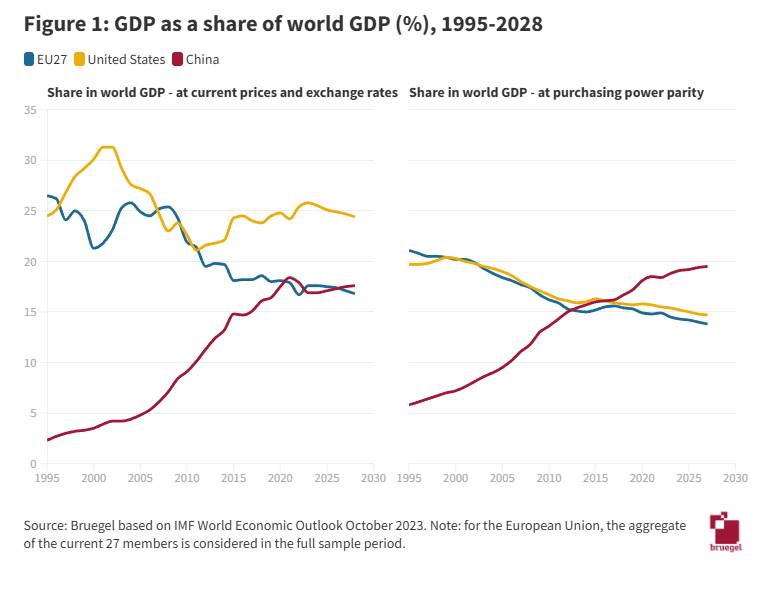West In The Desperate Search For Solutions ..…
by Ron Raskin

Why is Britain turning left while Europe turns right? There are many different perspectives on this; see, for instance, CNN and CNBC.
But if we look at what’s happening in Europe and the USA from a 10,000-foot view, we can see that the entire Western world is in a state of searching.
Since the dot-com crisis, the Western economy has been struggling. Household income growth in the US and Europe has been nearly flat, and the overall economic strength of both regions is in decline.

The world is changing, and pressure on the Western world is increasing. Challenges from China, Russia, Iran, and others determined to fight for global resource distribution by any means necessary, combined with Europe’s declining population and failure in immigrant integration, all demand a new approach. The only question is, what will that new way be?
This is the background for Brownian movement in the Western world: a search for a new direction, whether to the right, left, or somewhere else. Democracy is perhaps the best system to support such a search, still it can be a very dangerous time. Two main traps to avoid:
- Autocracy trap: Moving too quickly toward extreme ideas can lead countries to disastrous outcomes, similar to Nazi Germany or the Soviet Union (both: in 1917 and in 1991). Like a black hole, once a nation reaches the point of no return into autocracy, there is no way back for a long time. Fortunately, the contemporary world is more pragmatic and lacks many “solve-all-problems” ideologies. Putin’s Russia, for instance, is driven by pure interests rather than new ideology, and the same goes for China (“It doesn’t matter whether the cat is black or white, as long as it catches mice“, Deng Xiaoping). The concept of Jihad is indeed an all-encompassing ideology, but it is not relevant to the Western Christian world.
- Anarchy trap: Too many conflicting ideas and excessive polarization in society can lead to the collapse of government systems, ultimately paving the way for autocracy as the only escape from the worst-case scenario: a lack of governance and law. Putin’s Russia illustrates a notable example of such an outcome from the anarchy of the 1990s.
The pressure on the Western world isn’t expected to decrease anytime soon, as one key factor shows no mercy: demography. Low fertility rates are not only a healthcare and economic issue—impacting how to support an aging population—but also affect the overall power of nations.
Economic growth not only enhances quality of life but also supports technological and military superiority, as well as sustainable population density. This means that economically advanced societies may sustain larger populations. Historically, the percentage of Europe’s population in the world grew alongside its technological progress, peaking around 1913.Since then, Europe’s share of the world’s population has decreased from 28% to 10% and continues to decline. In a world where high-quality living standards require significant investment per child, the question arises: can such nations sustain high fertility rates?
Fortunately, there is at least one hopeful example—Israel. Constantly facing existential threats, Israel relies on both technology and high fertility rates for its survival. However, this demographic advantage comes with challenges: the highest fertility rates in Israel are among Orthodox groups, which hold values different from secular segments of society. Frictions between these groups already create internal tensions within Israel, reminiscent of European challenges with immigrant integration.
When looking around, demographic pressure appears to be one, if not the primary, reason that prompted Russia to seek its path towards launching a war against Ukraine. Once a global superpower, Russia now finds itself in a precarious situation: isolated, with a declining population and a weak economy, holding more than 10th of the total world’s landmass and significant global energy resources. In such circumstances, it is natural to question whether Russia can protect these resources and ensure its future security, especially with China and Muslim countries at its borders. From Russia’s perspective, the war with Ukraine represents its last chance to secure its long-term success and/or survival. Russia might consider victory not only as conquering Ukrainian territory or population, but also as reshaping the values within its own population to increase fertility rates.
Summary
Will Europe lose its way, or will it discover a new path? Will the Western world crumble like the Roman Empire (with the US playing a role akin to Byzantium), or will it find a savior similar to the US in the 20th century? Could India or another nation step in to rescue a declining Western World?
The search has only just begun, but its outcomes are critical for Europe and the entire Western World.

